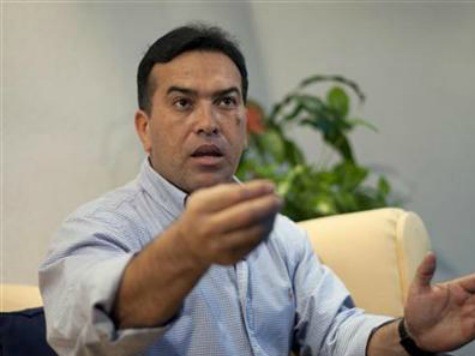
Venezuelan general Antonio Rivero surfaced from hiding to speak to the UK Telegraph about life on the run after President Nicolás Maduro issued a warrant against him for being a member of the opposition party. Rivero’s life in the underground reflects the reality of dozens of public officials no longer safe thanks to Bolivarian socialism.
Rivero skirts from car to car and admits to the Telegraph that he uses women’s makeup to hide from Venezuelan authorities, after Maduro’s government issued a warrant for his arrest. Rivero became the third official in the Popular Will party, after its leader, Leopoldo Lopéz, and acting leader, Carlos Vecchio, to be issued a warrant for political dissidence. Rivero was also arrested last year after protests against Maduro’s illegitimate reelection resulted in several deaths by the government’s hand.
“The root and inspiration of Venezuela’s revolutionary project is Cuba and Chavez chose Maduro as his successor because nobody is more loyal to that project better than Maduro,” Rivero told the publication, explaining that much of his opposition to the current socialist regime is its reliance on an impoverished communist dictatorship, one that siphons much of Venezuela’s oil out of the country for free.
Rivero is one of four generals Maduro has persecuted: three unidentified generals were arrested for “attempting to stage a coup,” while one remains a fugitive in his own home. A prolific tweeter, General Ángel Vivas is being protected by neighbors in Caracas and has refused to hand his weapons over to authorities.
The Telegraph also managed to reach Rivero’s boss in Popular Will, and the most famous political prisoner in Venezuela. Leopoldo López told the newspaper that he saw “the streets” as “the only option to force the ouster of Mr Maduro, although he insisted on the need for peaceful protests.” “Civil institutions such as the electoral and judiciary system have been utterly corrupted by the ruling government,” López noted, “which has ruthlessly persecuted all forms of disagreement. We are currently living a media blackout.”
The realities of López and Rivero reflect a much larger shift in the stability of the Venezuelan government, thanks to the violent repression of dissidents set in practice by Maduro. According to Infobae, 39 have died, 608 have been injured, and 2,285 Venezuelans have been arrested in the current wave of protests triggered by López’s arrest. Thirty percent of all mayors identified with the opposition party have charges leveled against them by the government. The situation has become so unstable that the nation’s Catholic leaders have stepped in, with the head of the Episcopal Congress of Venezuela denouncing Maduro for human rights violations, persecution, and murder.
Maduro announced the creation of a Human Rights Council in the nation this week, run by socialist party officials and set to investigate the “violations” by opposition leaders against the country.
Venezuelan police dispersed a protest calling for the liberation of López this weekend using teargas, shooting rifles at protesters, and throwing rocks. Such protests also resulted in Chavista arms paramilitary groups injuring a photographer from the Spanish news agency EFE. Due to the repeated use of teargas against opposition members, including a member of the National Assembly unconstitutionally ousted for having called for international intervention in the current crisis, the Spanish government has halted any sales of riot gear to the nation.

COMMENTS
Please let us know if you're having issues with commenting.